By John Saulnier, FFB Editorial Director
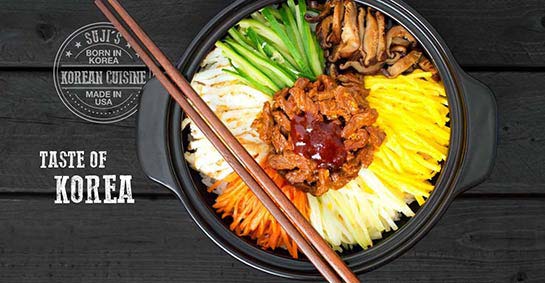
Suji Park wants to make the “Taste of Korea” as easy to enjoy across the USA as she’s made American-style cuisine and cross-cultural food fare convenient for consumers in Korea and Japan. From the look of things, the ambitious entrepreneur is well on her way to seeing the mission come to fruition.
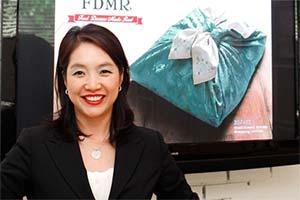
The founder and chief inspirational officer of Food Dreams Made Real (FDMR), Suji’s Restaurant Group and Suji’s Korean Cuisine heads a company that develops and supplies high quality, fully cooked food products to grocery store freezer cases and refrigerated cabinets in addition to deli sections at supermarkets, hot meal take-out counters and restaurants.
“Consumers want convenience as well as authentic flavor enhanced by healthy, less processed ingredients. Our frozen and refrigerated dishes bring traditional Korean flavors to the home chef that can be easily prepared and quickly enjoyed,” she told this writer over a sumptuous “Korean 101” working lunch at the Dong Bang Grill in Fort Lee, New Jersey.
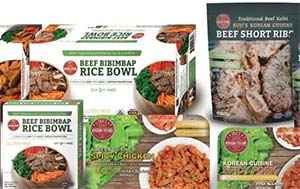 Indeed, the all-natural, preservative- and additive-free assortment of frozen retail offerings in the Suji’s Korean Cuisine line range from 9.5-ounce packs of thinly sliced, marinated savory beef and chicken bulgogi and spicy pork bulgogi, to fully seasoned, ready-to-grill traditional beef kalbi (beef short ribs thinly cut across the bone and then marinated in a blend of soy sauce, pear purée, vinegar and sesame oil), to 10-ounce beef bibimbap and spicy chicken bibimbap rice bowls.
Indeed, the all-natural, preservative- and additive-free assortment of frozen retail offerings in the Suji’s Korean Cuisine line range from 9.5-ounce packs of thinly sliced, marinated savory beef and chicken bulgogi and spicy pork bulgogi, to fully seasoned, ready-to-grill traditional beef kalbi (beef short ribs thinly cut across the bone and then marinated in a blend of soy sauce, pear purée, vinegar and sesame oil), to 10-ounce beef bibimbap and spicy chicken bibimbap rice bowls.
Born and raised in Seoul, the 46-year-old Seattle-based entrepreneur and restaurateur was recently on the US East Coast visiting buyers in New York and New Jersey. Having already won significant business from wholesale giant Costco on both sides of the Pacific, and secured listings at the Target retail chain, she is now focusing more sharply on solidifying a growing base in the conventional grocery segment that already includes H-E-B and Whole Foods.
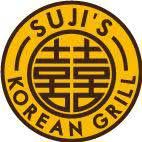 “We are targeting the American mainstream retail market, not ethnic stores,” she said. “Our strategy is the same with restaurants. After succeeding in Omaha, we are taking the Suji’s Korean Grill model to Nashville and elsewhere. In New York we will open a restaurant on the Upper East Side of Manhattan, not in Koreatown.”
“We are targeting the American mainstream retail market, not ethnic stores,” she said. “Our strategy is the same with restaurants. After succeeding in Omaha, we are taking the Suji’s Korean Grill model to Nashville and elsewhere. In New York we will open a restaurant on the Upper East Side of Manhattan, not in Koreatown.”
Park, who holds a BS degree from the Fashion Institute of Technology in New York City and has studied restaurant management and culinary techniques at the French Culinary Institute, got her start in the foodservice business in 2005 by opening restaurants in Seoul and Tokyo. Four years later she was developing and supplying Costco Korea with both retail and foodservice products (Suji’s Grilled Chicken Breast is the top seller in Costco Korea’s Department 19 division today), and in 2012 the line debuted at Costco Japan.
In addition to bulgogi and kalbi, Suji’s extensive assortment of frozen foodservice products runs the gamut from kimchi and vegetables in spicy Korean-style sauce, to potato and vegetable stew, cooked Udon noodles, brown rice with quinoa and edamame, cooked white rice and spicy chopped kimchi. Accented with just the right amount of red chili pepper, minced garlic, leek, onion and ginger, the finely diced fermented Napa cabbage offering is presented as “great for making kimchi fried rice and kimchi hot dogs.”
On to Omaha
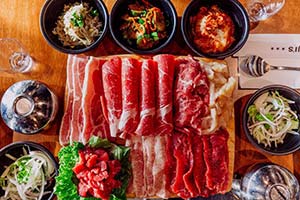 Suji’s Korean Cuisine was launched in 2014. Two years later came Park’s first restaurant in the United States, Suji’s Korean Grill. Having succeeded in introducing a New York-style deli restaurant to diners in Seoul and bringing the American Sunday brunch concept to her native country, it was on to Nebraska to deliver the real Korean meal deal to heartland America.
Suji’s Korean Cuisine was launched in 2014. Two years later came Park’s first restaurant in the United States, Suji’s Korean Grill. Having succeeded in introducing a New York-style deli restaurant to diners in Seoul and bringing the American Sunday brunch concept to her native country, it was on to Nebraska to deliver the real Korean meal deal to heartland America.
What attracted Park to the “Silicon Valley of Meat Production and Packaged Foods,” as Team Suji calls Omaha, was not necessarily Cornhuskers football or basketball fandemonium. The magnet was the University of Nebraska’s Food Processing Center in Lincoln, a multi-disciplinary resource for the food industry that offers consulting, educational, technical and business management expertise. What’s more, the cutting-edge development facility is well equipped to produce trial runs of value-added food products that can be fine-tuned and scaled up for industrial production.
And scaling up is exactly what Park has been doing. Her USA operation’s manufacturing capability embraces a network of state-of-the-art plants, two of which are exclusively dedicated to frozen entree production. Others pack shelf stable spicy sauces and marinades, HPP skin packs and custom-made meat products for restaurant operators, retailers and military channels.
‘True-to-Culture’ Cuisine
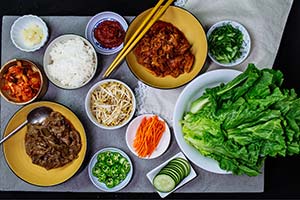 Deeply dedicated to true-to-culture Korean menuing, Suji doesn’t miss an opportunity to inform buyers and other interested parties about the Palace Royal Court and Temple roots and traditions of Korean cuisine. Also important to appreciate is the yin-yang spirit of Obangsaek that moves meal makers to incorporate into dishes as many of the five cardinal colors (yellow, blue, white, red and black) as possible to achieve both visual and flavor harmony. This is especially exemplified in bibimbap and tangpyeong-chae (mung bean jelly salad).
Deeply dedicated to true-to-culture Korean menuing, Suji doesn’t miss an opportunity to inform buyers and other interested parties about the Palace Royal Court and Temple roots and traditions of Korean cuisine. Also important to appreciate is the yin-yang spirit of Obangsaek that moves meal makers to incorporate into dishes as many of the five cardinal colors (yellow, blue, white, red and black) as possible to achieve both visual and flavor harmony. This is especially exemplified in bibimbap and tangpyeong-chae (mung bean jelly salad).
“Palace food is sumptuous, full of hearty meats and side plates. It is full of bold and pungent flavors and spices, and emphasizes bringing people together at the table,” she explained. “Temple food is vegetarian, and lighter with exquisite subtle flavors. In the temple tradition, food preparation and presentation becomes a practice of mindfulness with special dishes prepared for the altar on holidays.”
The dinner menu at Suji’s Korean Grill in Omaha leans palatial with such offerings as “Endless Korean BBQ” featuring marinated beef bulgogi (thinly sliced ribeye steak), flank steak and brisket. Also featured are sam-gyeop sal (pork belly), hangjung sal (pork jowl) and chicken bulgogi in a light Korean marinade. All are served with banchan (vegetable side dishes), lettuce leaves, samjang (seasoned bean paste sauce), rice and house soy sauce vinaigrette.
Among lunch specials are japchae dup bap (pan-fried sweet potato noodles with vegetables and a choice of beef, pork, chicken or tofu); L.A. kalbi; grilled salmon with Korean savory sauce; vegetable pajun (savory scallion pancake with mixed vegetables); vegetable gimpap (seaweed rice roll with finely chopped vegetables); and a variety of dol-sot bibimbap bowls (assorted vegetables and rice topped with a fried egg).
“Over the past year savory umami Korean food flavors have become very popular in Omaha, where most of our customers are non-Koreans. They appreciate tasty, wholesome, all-natural cuisine that is free of added preservatives,” said Park.
As evidenced by the drink selection on the menu, some Nebraskans are also be learning to appreciate the relaxing effects of Chamisul Classic Soju. Described by some imbibers as “low-proof Korean vodka,” the distilled rice, wheat or barley-based spirit pairs exceptionally well with meat. Other Nebraskans, among them personnel from nearby Offutt Air Force Base who were previously based in South Korea, may well have already mastered the etiquette and perhaps even conquered the consequences of soju sampling.
Bringing people together to enjoy Suji’s Korean Cuisine, either in a home dining room or at a restaurant table, is Park’s professional raison d’être. Her ongoing success in this mission will depend on educating less adventurous consumers to try something new.
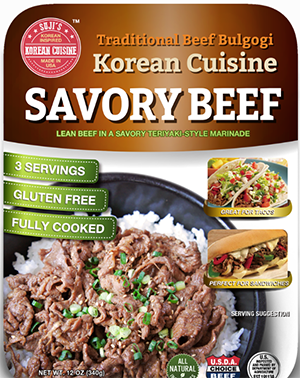 “We also take an educational approach with our packaging,” she pointed out. “For example, our beef bulgogi is marketed as ‘Savory Beef’ in order to hopefully get a critical second look from consumers who may not be familiar with Korean food. We then introduce the product to the customer through information on the what’s and why’s as part of the rest of the package.”
“We also take an educational approach with our packaging,” she pointed out. “For example, our beef bulgogi is marketed as ‘Savory Beef’ in order to hopefully get a critical second look from consumers who may not be familiar with Korean food. We then introduce the product to the customer through information on the what’s and why’s as part of the rest of the package.”
The other big challenges for her business lie in managing distribution and human resources. Up until now the thinking has been that all restaurant operations with the Suji’s marquee will require Korean chefs who know the ins and outs of proper preparation and presentation. So far finding and maintaining such skilled staff has not been a problem.
Beyond the restaurant scene, thanks to frozen dinners, entrees and components, anybody can take “centuries in the making, but ready in minutes,” packages of Made-in-USA Suji’s Korean Cuisine and stir-fry, microwave or boil-in-bag the contents to perfection. The tasty result is Maatitsuhyo!
Don’t forget to chill the Soju to serve with the meal, raise a glass and toast appropriately: Geon-bae!




